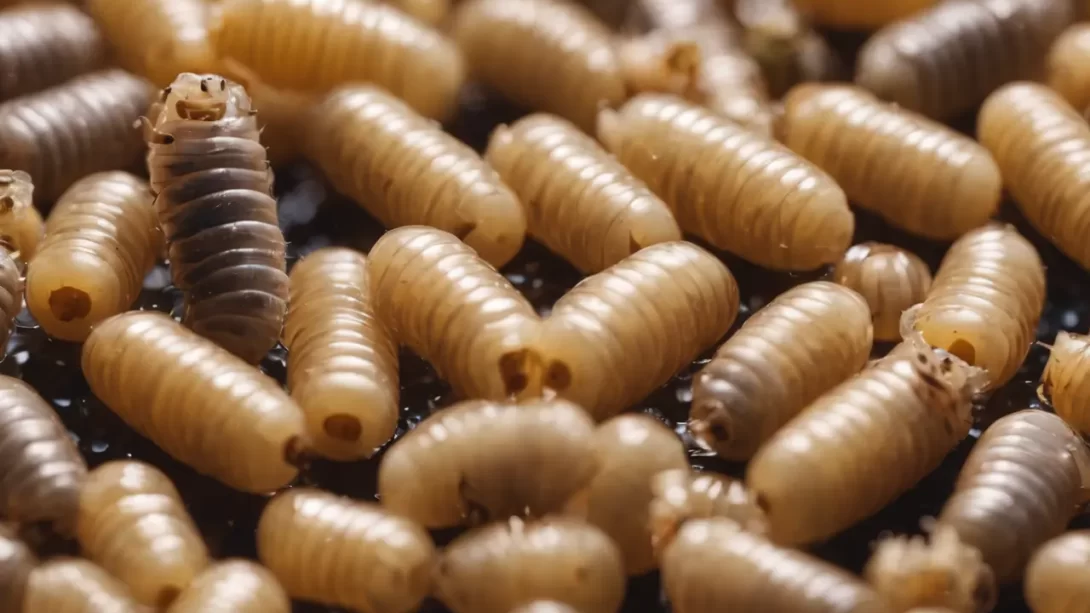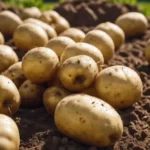Maggot infestations, often found in trash cans, compost bins, and even in homes, can be a distressing and unhygienic problem. Among various home remedies, salt is frequently suggested as a solution to kill maggots. This article evaluates the effectiveness of salt in combating maggot infestations, providing insights for those seeking practical and accessible methods for pest control.
Maggots
Maggots are the larval stage of flies, typically the common housefly. These small, white larvae thrive in moist environments rich in organic material, such as garbage, decomposing food, and animal waste. Maggots play a role in the decomposition process but can become a nuisance and a health hazard when they infest living spaces. Understanding their life cycle and the conditions that lead to infestations is crucial for effective control and prevention.
The Science Behind Salt and Maggots
Salt, or sodium chloride, is known for its dehydrating properties. When applied to maggots, it absorbs moisture from their bodies, leading to dehydration and death. This method of control is based on creating a hostile environment that is uninhabitable for the larvae. Compared to other desiccants, salt is readily available and non-toxic, making it an appealing option for household use. However, the effectiveness of salt can vary depending on the extent of the infestation and the application method. It’s important to consider these factors to determine whether salt is a practical solution for specific maggot problems.
How to Use Salt for Maggot Infestations
Effectively using salt to combat maggot infestations involves a straightforward process. Here’s a guide on how to apply salt for maximum effectiveness:
- Identification and Preparation: Identify the infested area. This could be a trash can, compost pile, or any place where organic waste accumulates. Before applying salt, remove as much of the waste material as possible, as this is the source of the maggot infestation.
- Application of Salt: Liberally sprinkle salt over the maggots. Ensure that a generous amount of salt is applied directly to the maggots and the area around them. The salt works best when it makes direct contact with the larvae.
- Monitoring and Reapplication: After applying salt, monitor the area to see if the maggots have been effectively killed. It may be necessary to reapply salt if the infestation is severe or if new maggots appear.
- Disposal: Once the maggots are dead, clean the area thoroughly to remove any remaining maggots, eggs, and salt residue. Proper disposal of the waste will prevent future infestations.
Precautions and Considerations
While using salt is a relatively safe method to kill maggots, there are some precautions and considerations to keep in mind:
- Environmental Impact: Excessive use of salt can lead to soil salinity issues, especially in outdoor environments. It’s important to use salt judiciously and only in areas where it won’t harm the surrounding ecosystem.
- Corrosion: Salt can be corrosive to certain materials. Avoid using it on surfaces that can be damaged by salt, like metal trash cans or compost bins.
- Effectiveness: Salt may not always penetrate deep into maggot-infested materials, especially in large or dense infestations. In such cases, additional measures might be necessary.
Alternative Methods for Controlling Maggots
While salt can be effective, it may not be suitable for all situations. Here are some alternative methods for controlling maggots:
- Boiling Water: Pouring boiling water over maggots is a quick way to kill them. However, be cautious with this method to avoid burns and damage to surfaces.
- Vinegar and Baking Soda: A mixture of vinegar and baking soda can create an inhospitable environment for maggots. This method is less harsh than boiling water and is environmentally friendly.
- Commercial Insecticides: There are various insecticides specifically designed to target maggots. These should be used as a last resort and according to the manufacturer’s instructions for safety.
- Diatomaceous Earth: This natural powder can effectively kill maggots by dehydrating them. It is safe to use around pets and children when applied correctly.
- Preventive Insect Repellents: Using natural or commercial insect repellents can deter flies from laying eggs, thereby preventing maggot infestations.
Preventing Maggot Infestations
Prevention is key in controlling maggot infestations. Here are some tips:
- Proper Waste Management: Regularly dispose of garbage and keep trash cans clean and sealed. Compost bins should be well-maintained to prevent odor and excess moisture.
- Regular Cleaning: Clean up food spills immediately and store food in sealed containers. Pay attention to hidden areas where organic matter can accumulate.
- Sealing Entry Points: Seal cracks and openings in doors, windows, and walls to prevent flies from entering and laying eggs.
Conclusion
Salt can be an effective method to kill maggots, especially for small infestations or as a quick solution. However, it’s important to consider its limitations and the potential impact on the environment. Alternative methods and preventive measures should be part of a comprehensive approach to maggot control. By combining different strategies and maintaining cleanliness, you can effectively manage maggot problems and prevent future infestations. Remember, the most effective pest control is a proactive and integrated approach tailored to your specific situation.



